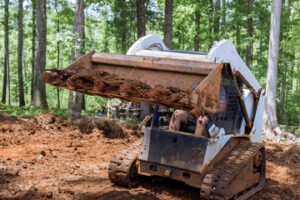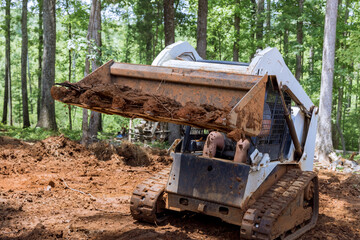Excavation Services provide crucial support for construction projects. From foundation excavation to land clearing, it’s an essential part of the building process.
Experienced contractors adjust their work to meet the needs of each project. They also plan carefully and communicate clearly with other crews to prevent unnecessary delays.
They set up infrastructure, such as water, sewer, and electrical lines, digging trenches for pipes. They also mark utility locations to avoid accidental damage.
Whether you are working on large-scale commercial construction projects or residential renovations, excavation services are a crucial part of the process. They lay the groundwork for a project’s success by transforming the landscape into a functional space customized to meet specific building or landscaping needs. Experienced professionals understand that every project is unique and adjust their approach accordingly. This adaptability ensures that the excavation process aligns with construction timelines and budget constraints.
One of the most significant challenges in excavation work is identifying and avoiding existing underground utilities. This is why it’s important to hire a professional who has the expertise and advanced equipment needed to safely locate utility lines and avoid costly delays. In addition to ensuring compliance with environmental regulations, excavation contractors must also perform a detailed site analysis before any earth is moved. This allows them to identify any potential issues and plan accordingly, minimizing the risk of accidents and re-work.
As new technologies and methods are introduced, it’s critical that excavation contractors stay up-to-date on the latest techniques and equipment. Demonstrating that your company is committed to innovation and advancement can help attract clients who are looking for a partner with a forward-thinking approach to their work. Moreover, highlighting your ability to utilize cutting-edge tools and techniques on your website will set you apart from competitors and demonstrate that you are at the forefront of the industry.
Ultimately, effective collaboration between excavation professionals and clients is essential to project success. This starts with clearly communicating project goals, timelines, and specific requirements. It also includes maintaining regular communication and being open to recommendations from excavation experts. In addition, implementing an online portal like Desygner will enable you to provide your clients with timely and relevant updates about their project’s progress, as well as track progress over time.
Moreover, it is important to remove or temporarily relocate any structures that could obstruct excavation activities. This includes sheds, fences, outdoor furniture, or any other items that could interfere with equipment access. It’s also essential to clear any overgrown vegetation and debris that might obstruct the excavation area.
Precision
In construction projects, excavation services are often considered the unsung heroes that lay the groundwork for everything that follows. From building foundations to installing utilities, excavation contractors are responsible for digging trenches and sculpting the land so that it can support construction and landscaping initiatives.
Experienced excavation contractors have an in-depth understanding of the different types of soil that are found on a property and are well-versed in topographical maps, helping them to foresee potential issues that could delay or derail construction projects. They also have access to specialized equipment that can help them navigate obstacles and complete tasks more efficiently.
Preparing a Site
The first step in preparing a construction site is clearing the area of overgrown vegetation, rocks, and debris. This is essential for creating a solid foundation and ensures that there is enough space to maneuver large motorized equipment. It is also important to clear any structures such as sheds, fences, or outdoor furniture that may obstruct work areas or prevent equipment from gaining access to the jobsite. Additionally, it is a good idea to call the local utility company to have them come out and mark the location of any underground lines like water, sewer, gas, or electrical pipes so that they do not get accidentally damaged during excavation.
Once the site is cleared, excavation contractors will begin their work. They will carefully dig trenches to accommodate utility lines or other infrastructure components while ensuring that the layout adheres to all safety and building codes. Using a GPS or laser system, they will track progress and make real-time adjustments as necessary to maintain accuracy.
Excavation contractors are also vital for demolition projects, as they will use their specialized equipment to dismantle structures and clear the site for new construction. This can be especially helpful in commercial settings where there are a lot of older buildings that need to be removed before new development takes place. This is typically a much faster process than trying to tear down structures by hand. Having an experienced team on hand to handle these types of tasks can save a business time and money in the long run.
Safety
Whether it’s building a skyscraper or a garden retaining wall, the foundation for excavation projects must be solid to support whatever structure is constructed on top. Creating a solid foundation requires more than just digging into the earth—the right tools and techniques are necessary for safe, secure excavation. A professional excavation service has the expertise to ensure that the soil is stable and will be able to withstand whatever structure is built on top of it.
A variety of safety measures are taken during excavation to protect workers, passersby, & the equipment. For example, physical barriers & signage are placed around the excavation site to prevent unauthorized access & keep people out of danger zones. It’s also important to ensure that any heavy machinery is properly operated and inspected on a regular basis before allowing it to be used again.
Accidental contact with underground utility services, such as water, gas, electricity, or telecommunications lines, is a major risk for excavation workers. This can not only injure or kill the worker, but it could disrupt vital services and cause costly repairs for homeowners. To mitigate this risk, workers should always call 811 before starting any digging work & create a utility map before beginning an excavation project.
Another common risk for excavation workers is inhaling hazardous contaminants, such as heavy metals, chemicals, or petroleum products. These contaminants are often present in contaminated soil. To minimize this risk, workers should be trained to identify contaminated soil and follow established SOPs for marking, segregation, handling, and disposal.
Finally, excavation sites often occur in close proximity to high-traffic areas. This can pose a significant risk to workers who must navigate their heavy machinery through traffic and pedestrians. This risk can be minimized by placing barriers & signage to protect people from falling into the excavation zone and by restricting access with fencing & barricades.
In addition to these safety measures, it’s essential to make sure that the work area has sufficient space for large equipment like backhoes & bulldozers. This will allow them to operate more quickly & efficiently, while minimizing the risks for everyone involved.
Experience
Choosing the right excavation contractor is an important step in transforming your project vision into reality. A licensed contractor adheres to local safety and professionalism standards, and they have the experience and expertise to successfully complete your sitework. They can also provide additional services, such as removing overgrown vegetation and preparing the site for excavation. Additionally, they can clear structures like sheds or outdoor furniture that might obstruct equipment access. Moreover, they can help you locate underground utilities, such as water lines, sewer pipes, or electrical conduits. This prevents costly mistakes and unforeseen delays.
Excavation is a complex process that requires the knowledge of earthwork and topographical maps. The best contractors are fast to adapt to unforeseen complications and can work efficiently, maintaining productivity and quality throughout the project. Additionally, they have strong relationships with material suppliers and can negotiate favorable rates for bulk purchases. These benefits allow them to save time and money on project costs and ensure high quality outcomes.
One of the most common reasons to hire an excavation service is to create a solid foundation for construction or landscaping projects. A quality foundation is essential to the structural integrity of your building or garden retaining wall, and excavation experts have the tools and knowledge to dig trenches properly.
Moreover, professional excavation contractors can install underground utility installations on commercial properties. For example, they can dig trenches for installing French drains, catch basins, culverts, and other drainage infrastructure to manage stormwater runoff and prevent flooding and erosion on the property. They can also design and implement landscaping features that improve the appearance of your property.
A good excavation service can also assess soil quality and replace compacted or nutrient-poor dirt with fresh, rich material. This process helps promote root growth, improves drainage, and creates a more hospitable environment for plants. They can also assist with land grading, which can help direct water flow away from buildings and paved surfaces to prevent standing water and other environmental hazards. Finally, they can also remove trees and shrubs that are obstructing the excavation area.
